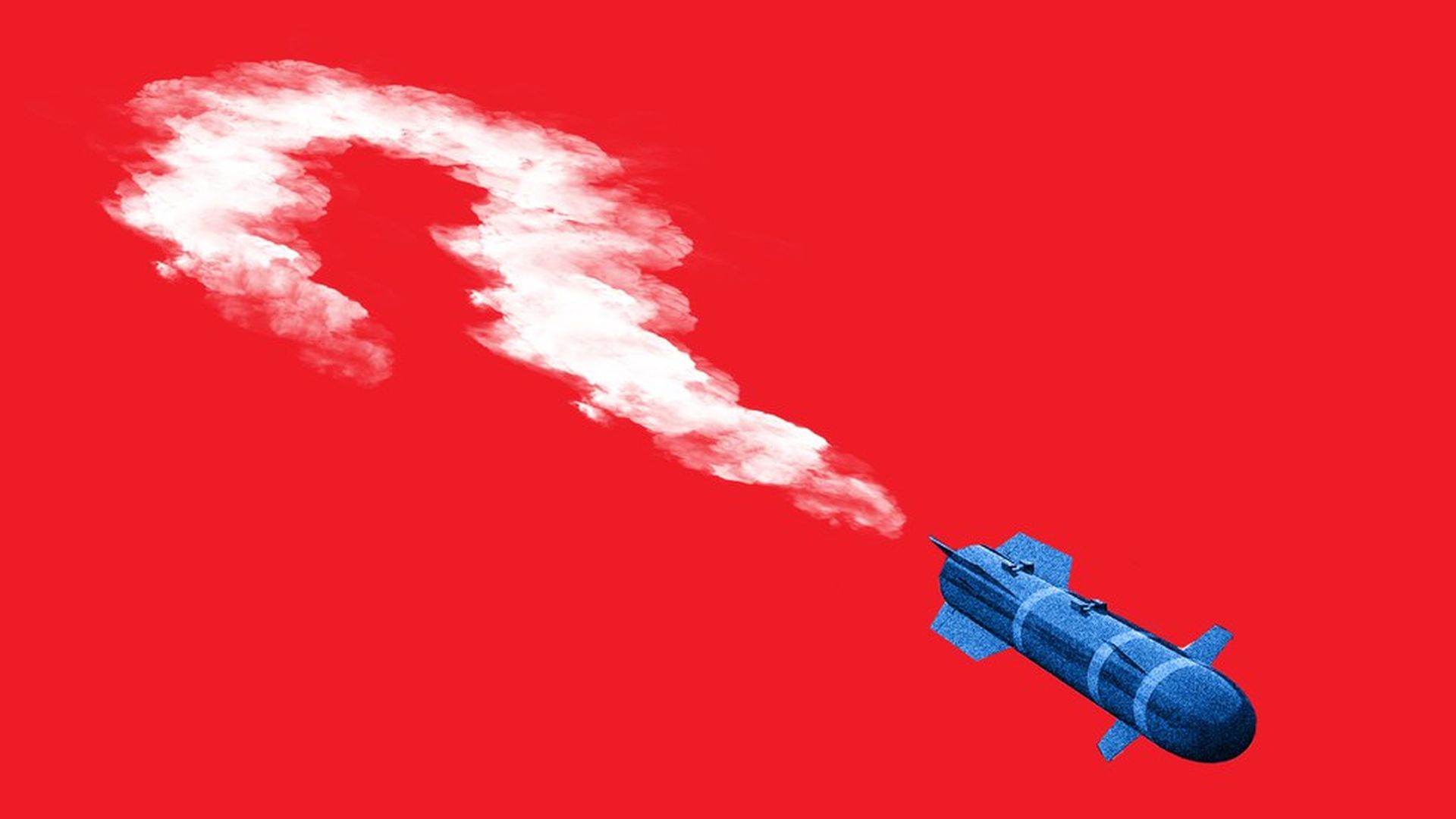How ready is the U.S. for a North Korean missile attack?
Add Axios as your preferred source to
see more of our stories on Google.

Rebecca Zisser / Axios
A successful May test of the U.S. long-range missile interceptor program, designed to destroy a possible North Korean missile before it could hit the U.S., was called a "critical milestone" by then-Missile Defense Director Vice Adm. Jim Syring. But since then North Korea has tested a missile that could possibly threaten the U.S. mainland.
So how ready is the U.S. for a North Korean missile attack on the West Coast? Syring told Congress last month we're "not…comfortably ahead of the threat."
The U.S. is making progress
- We're "[a]head in terms of offensive ability" — Adm. James Stavridis, former Supreme Allied Commander of NATO and current dean of The Fletcher School at Tufts University.
- The U.S. has a "real capability" to defend the country and "we're in a relatively advantageous position" to the threats from North Korea — Tom Karako, senior fellow on the Missile Defense Project at CSIS.
- Our missile defenses could "absolutely work" — Bruce Bennett, Senior International Defense Researcher at the RAND Corporation.
- "We are confident that we have the capability to defend the nation against ballistic missile threats" — Lt. Gen. Sam Greaves, director of the Missile Defense Agency.
But so is North Korea
- We're "falling behind in defensive" ability — Adm. Stavridis.
- "We continually underestimate" North Korea's capabilities — Joshua Pollack, Editor of The Nonproliferation Review.
- North Korea's advancing its offensive capabilities faster than we are advancing our defenses to counter them, Karako said. "You don't know you can [stop a nuke]. You have to do a mix of things" to stop it.
- The U.S. "just can't be sure we could stop" a North Korean attack, per Bennett.
- Go deeper: How prepared North Korea is to attack
The worrying realities
- The missile-defense system has a 55% success rate over its lifetime, per Reuters, and hasn't faced a real threat. "I have very little confidence that it can work, because it's so technologically challenging…" Pollack said. Plus it was deployed "in a hurry in 2004 before it was really ready," and "it does not perform well in tests." And "even if it did…it could be overcome."
- U.S. missile defense math works now, but barely. Last summer we had just enough underground missile interceptors (36) to block the maximum number of missiles we are aware North Korea could launch (6), assuming we launch 6 interceptors per missile to effectively block both decoys and a real nuclear warhead. Now the U.S. has 44 interceptors placed around the country, increasing that margin of error.
- Adm. Stavridis told Axios: "defensively, we can knock down one or two missiles, but as [North Korea's Kim Jong-un] builds his inventory, we will fall behind." Pollack said he "wouldn't want to count on" the system, noting the fact that we have to launch several interceptors per missile shows "there's not a lot of confidence it will work."
- Pollock warned: "it's much easier for them…to add one missile than for us to add four to five interceptors."
The DoD wouldn't comment on the outlook for increasing the number of U.S. missile interceptors this year, but the outlook will be released in the Missile Defense Review early next month, Pentagon spokesperson Tom Crosson told Axios. The Pentagon wouldn't comment on intelligence matters regarding what its assessment is on how many missiles the DPRK could launch at maximum at once.
In an ideal world...
... the U.S. would be able to stop a nuclear warhead before it's on its trajectory, or disable it through a cyber attack. But:
- We don't have "boost phase" defense, which stops a warhead before it separates from a missile, which would be "the preferred situation," Bennett said. The Missile Defense Agency director said they're pursuing the program as a "long-term goal" so we can "shift the calculus" of our adversaries. But even if we develop boost phase defense, the risk is that the boost phase is so short (about a minute, according to Bennett), that the U.S. probably wouldn't be able to reach the missile in time, and if we falsely detect a nuclear launch — but it's actually just a test — we risk provoking North Korean retaliation.
- We might not be able to rely on cyber ops to stop nukes. Stavridis, the former NATO commander, told Axios we have "reasonable" cyber options" but "nothing is fullproof." There's been some reported success in tampering with nuclear launches from North Korea, but as Bennett pointed out, "North Korea does not generally connect to international internet" so hacking into their computers and control systems would be incredibly difficult. As Karako put it, "there is no magic cyber wand that will take care of this problem." The Pentagon wouldn't comment on cyber ops.
Adm. Stavridis said the U.S. has "a bad set of options."
His bottom line: "There is no silver bullet. We need layered offensive (cyber, special forces, massive strike) and defensive (boost, cruise, terminal missile defenses) and will need to pace both if we cannot achieve a diplomatic solution."
The Pentagon wouldn't comment on intelligence matters regarding what its assessment is on North Korea's capability to hit the U.S. mainland. Initial assessment indicated the November missile North Korea launched was an ICBM.
Go deeper: U.S. defensive measures compared to North Korea's threat explained ... How prepared North Korea is to attack
Editor's note: This was originally published in July, 2017 and has been updated.
